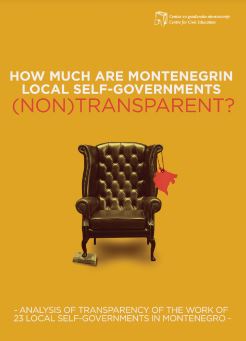How much are Montenegrin local self-governments (non)transparent? - Analysis of transparency of the work of 23 local self-governments in Montenegro
How much are Montenegrin local self-governments (non)transparent? - Analysis of transparency of the work of 23 local self-governments in Montenegro
Author(s): Mira Popović
Contributor(s): Daliborka Uljarević (Editor)
Subject(s): Politics, Governance, Government/Political systems, Corruption - Transparency - Anti-Corruption
Published by: Centar za građansko obrazovanje (CGO)
Keywords: Montenegro; governance; transparency; local self-governance;
Summary/Abstract: The public administration system in Montenegro is undergoing reform interventions for decades with the aim of harmonizing with the best European standards and practices, which should, among other things, make public administration more accessible to citizens. An important parameter of improving public administration work is transparency, which is also the focus of this research. In assessing the level of transparency of local self-governments, two cross section points were chosen. The first is a crosscheck of manner of local self-governments’ resolving issues and their one-year performance in resolving requests for free access to information, with proceedings upon complaints that have arisen as a result of initiated and cases which have been resolved unfavourably for the party, including those relating to the administration silence, therefore, in accordance with the Law on Free Access to Information these data were requested from all local self-governments. The second cross-cutting point is an assessment to which extent the 23 local self-government’ websites in Montenegro contain information that must be accessible to citizens under the provisions of Article 12 of the Law on Free Access to Information. Transparency of work of local self-governments in Montenegro chronically represents one of the weaker points of the system. There is a high degree of tolerance to non-compliance with the provisions of the Law on Free Access to Information by authorised bodies, there are also numerous different interpretations of the same provisions of this Law by the officials who deal with the requests, and inadequate staff solutions are notable with the ever-increasing administration silence. All this causes a large number of complaints filed to the Agency for Personal Data Protection and Free Access to Information, which itself as well, due to a lack of staff, has the problem of resolving cases within a reasonable time. The latest amendments to the Law on Free Access to Information that have further restricted access to information and closed the system by giving discretionary right to managers of bodies to mark documents as business or tax secret without providing a deadline stating the reasons for restricting access to information, are consequently cumulatively strengthening a rather low degree of transparency of work of local self-governments. The Strategy of Public Administration Reform in Montenegro 2016-2020 recognizes a reduced level of transparency in processes such as conducting public procurement, budgeting and recruiting new staff. The same problems are also pointed out by the European Commission’s Report on Montenegro for 2018 and the Report on Implementation of Action Plan for implementation of Chapter 2 for period January-June 20183. Thus, the key planned activities are aimed at improving transparency in the planning process, the adoption of acts and their implementation with the respect of the principle of participation and establishment of a transparent public procurement procedure in accordance with the Law on Public Procurement. The SIGMA Monitoring Report on Montenegro also warns about the problem of nonavailability of data on employees and their earnings, which is part of a proactive publication of data. This paper provides a cross section of the observed parameters along with basic guidelines as to how to overcome some of the identified problems related to (non) transparency of local self-governments. The first part deals with the manner of resolving of local self-governments’ bodies and overview of the data obtained as per requests for free access to information sent to local self-governments, after which availability of data on websites of municipalities was processed in detail in comparison with the application of Article 12 of the Law on Free Access to Information. From this, conclusions and key recommendations for improvement of the existing system were made.
Series: CGO - Demokratija
- Page Count: 18
- Publication Year: 2018
- Language: English
- Introduction
- Content File-PDF

